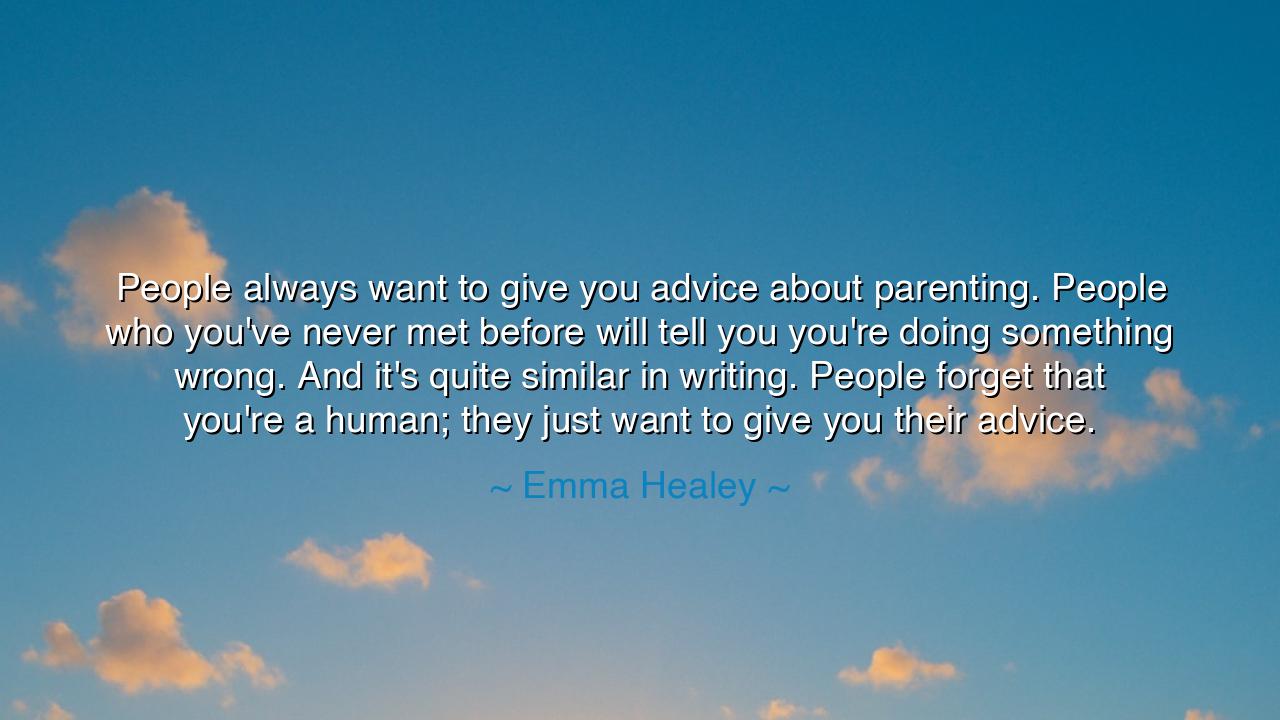
People always want to give you advice about parenting. People
People always want to give you advice about parenting. People who you've never met before will tell you you're doing something wrong. And it's quite similar in writing. People forget that you're a human; they just want to give you their advice.






Emma Healey, with the clarity of one who has walked the fragile path of both art and family, once said: “People always want to give you advice about parenting. People who you’ve never met before will tell you you’re doing something wrong. And it’s quite similar in writing. People forget that you’re a human; they just want to give you their advice.” In these words, she uncovers the strange burden of those who dare to create—whether it be children or books. Both callings are deeply personal, yet both are subjected to the judgments of strangers who cannot see the hidden labor, the sleepless nights, the quiet courage that lies beneath the surface.
The origin of this thought rests in Healey’s dual experience as both mother and writer. As an author whose work reached many, she found herself exposed to endless opinions, critiques, and unsolicited directions. Likewise, as a mother, she encountered the same phenomenon: strangers in the street, acquaintances, even those who meant well, felt compelled to tell her how to raise her child. In this overlap between parenting and writing, Healey saw a common truth—that whenever one creates, others feel entitled to judge, forgetting that the creator is still a human, tender and vulnerable beneath their brave exterior.
This wisdom is not new. History has shown again and again that those who bring forth life, whether in flesh or in art, are subject to the voices of critics. Think of Mary Shelley, who as a young mother and writer brought Frankenstein into the world. Her book was condemned, ridiculed, and judged by many who could not see the genius within it, just as mothers are often judged by those who never carried their burdens. Or recall Socrates, condemned for “corrupting the youth,” though he was only teaching them to think. To create—whether child, book, or idea—is to invite criticism, for others will always seek to mold what they did not themselves bring into being.
And yet, Healey’s words also carry a quiet resilience. By comparing parenting to writing, she reminds us that criticism, though constant, need not define us. A writer cannot silence every opinion, nor can a parent satisfy every voice. The task is not to obey every suggestion, but to remain faithful to one’s own vision, one’s own love, one’s own instinct. Just as the artist must write with truth rather than appeasement, so too must the parent raise their child with authenticity rather than fear of judgment.
Her insight also reveals the loneliness of creation. Those who judge often forget that the parent and the writer are not machines, but souls. To dismiss their struggles with unsolicited advice is to strip away their humanity. Yet in naming this truth, Healey restores it. She reminds us that behind every book is an author, trembling with hope; behind every child is a parent, carrying love mingled with uncertainty. To remember this humanity is to treat both with compassion rather than criticism.
The lesson, then, is clear: do not allow the voices of strangers to drown out the wisdom of your own heart. Seek counsel, yes, but discern wisely. Listen to those who know your journey, who have earned the right to speak into your life. But when uninvited criticism comes—as it surely will—remember that it is the cost of creating something precious. Your child, your book, your work, is not meant to please all voices, but to live, to grow, to breathe with its own authenticity.
Therefore, let Emma Healey’s words endure as both shield and reminder: “People forget that you’re a human; they just want to give you their advice.” When you face the chorus of voices, remember your humanity. Remember that to create is to risk judgment, but also to bring forth beauty that no critic can erase. In both parenting and writing, stand firm, be humble, but remain true. For it is not the voices of strangers that shape destiny—it is the steadfast love and faith of the one who dares to create.






AAdministratorAdministrator
Welcome, honored guests. Please leave a comment, we will respond soon